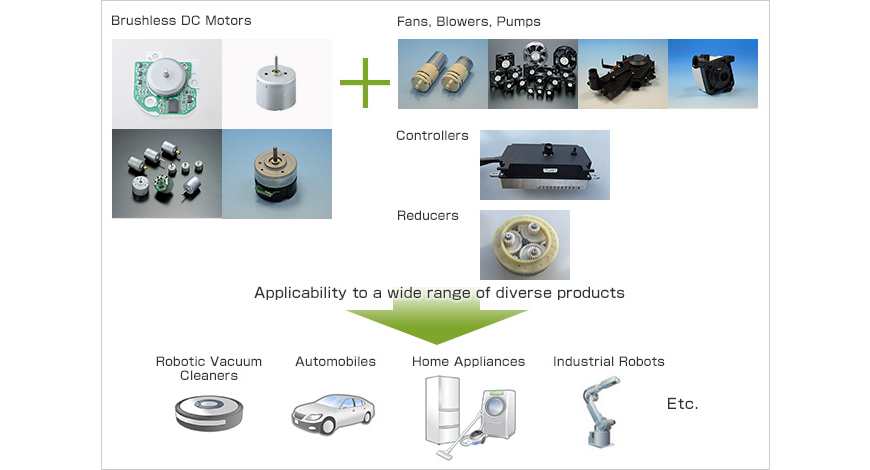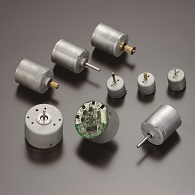NIDEC's Technical Capabilities
Solutions Centered on Brushless DC Motors
Optimally Designed Modules Combining Motors with Fans, Blowers, Pumps, Gears and Controllers
By integrating motors and other components such as fans, blowers, pumps, reduction gears, controllers etc into modules early in the product development process, their overall performance can be optimized. This modular design approach has long been employed in the automobile industry and has recently started to gain ground in the home appliance industry as well. At Nidec, we are contributing to this shift with an increased number of solutions involving motor-based modules.

Brushless DC motors—the forte of Nidec—are characterized by being compact, lightweight, highly-efficient and having high controllability. In order to take full advantage of these properties, we make use of advanced tools to assist our customers in the design of their products as well. For example, by using supercomputers to analyze the air flow of a ceiling fan, we were able to develop an improved blade design, allowing the fan to displace a larger volume of air at a lower rotational speed, in addition to optimizing the energy-saving capabilities of the brushless DC motor.
Robotic vacuum cleaners constitute another area in which our solutions have made an impact. Adopting our blower modules instead of brushed motors saves space and increases battery run-time while maintaining the same suction power. Furthermore, by using our sensors that scan the floor for specks of dust and interact with the wheel drive modules, smart robotic vacuum cleaners—capable of adjusting their speed and suction power depending on how dirty the floor is—become a possibility. These are just a few examples of our solutions grounded in the concept of efficient and functional robotic vacuum cleaners.
Nidec has a history of contributing to reducing refrigerator energy consumption by developing more efficient fans used to circulate cool air inside the refrigerators. Now, we are taking this a step further by using air flow analysis technology to improve the design of the duct systems and calculate the optimal position for our specialized thin blower modules as well, allowing for more energy-efficient and spacious refrigerators. By expanding our capabilities beyond our own products we are able to offer advice that leads to even better designs.

Recently, eco homes equipped with solar panels and storage batteries have started to become a common occurrence. Since the solar energy systems used in these homes generate and store DC power, it goes without saying that brushless DC motors—capable of bypassing AC-DC conversion loss—are optimal for powering the many appliances that make up the infrastructure of our modern homes, such as ventilation fans and water heaters. In addition to being able to utilize solar power more efficiently, DC powered home appliances are also attracting attention for their ability to be used off-grid in emergencies. As a result of this, DC appliances are expected to see increased use outside of cordless applications in the future.
As the range of applications for brushless DC motors expands, we step up our development of modules and solutions centered on these motors, driven by our mission to contribute to the high-performance, high-functionality appliances of the future.



